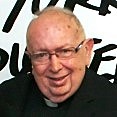"What's Faith Got to Do with It?"
 Wednesday, October 15, 2008 at 7:00PM
Wednesday, October 15, 2008 at 7:00PM A 4-lecture series given by Msgr. Lorenzo ALBACETE on the relationship between faith and life in some challenging areas
FAITH AND POLITICS: Do they mix?
Wed., October 15, 2008
FAITH AND SCIENCE: Are they in conflict?
Wed., October 22, 2008
FAITH AND MONEY: Do they add up?
Wed., October 29, 2008
FAITH AND ROMANCE: Are they a good match?
Wed., November 5, 2008
Presented by Crossroads Cultural Center
“What's faith got to do with it?” is a series of four lectures What Monsignor Albacete will be talking about is, of course, the relationship between faith and life in four important human phenomena (politics, science, economics, affectivity).
In doing this, we would like to avoid two easy traps: the first one is to take this relationship for granted, by making an a priori decision that faith has everything to do with these phenomena (or, conversely, that faith has nothing to do with them). On the contrary, we would like to put this supposedly necessary relationship (or lack of it) to the test, and verify experientially whether faith can have an interesting, positive, valuable, impact on these aspects of daily life.
The second trap is to assume that, in any case, such relationship affects primarily the ethical realm, that is, how someone who has faith should or should not behave. On the contrary, we consider that faith is first of all knowledge, through revelation, of the mystery of God, which is the mystery of Being, the origin of all created realities. If this is so, in the words of Benedict XVI in Regensburg, faith should “broaden” our reason, give us a better vantage point to look at the world and decipher the workings both of nature and of history.
This is the intuition behind this series: we have asked Msgr. Albacete the question: how does faith shed new light on each of these four realities? Does faith reveal something new and previously unnoticed about these things? Does it change the way we should think about them? And then, as a result, does it change the way we live them?
Faith and politics is a good example. It is almost universally assumed that faith's chief contribution to politics is to provide “values.” Both sides of the political spectrum claim, to some degree, that Christianity is an important source of inspiration. Of course, each side is also perfectly prepared to dismiss faith as a valid motivation when it gives support to policies they don't like. But the question we want to raise tonight is, is that it? Is the relationship between faith and political life just one of ethical guidance? Given that we all agree that Christianity helps us appreciate, say, the value of life or the need for social justice, does it have any deeper impact on the way we live together in society? Does faith give any new insight into political life? Does it make us understand differently the concept of democracy? Do Catholics have a genuinely different view of the role of the state? What about faith and freedom? Does Christianity support political freedom or threaten it? Is the Church in some sense a political reality? Should faith have a social role or be a strictly private affair? Is the social doctrine of the Church yet another political ideology? How should it affect the way we approach politics in our country? Monsignor will help us address all these questions.
About this Event
Date: Every Wednesday from October 15 to November 5, 2008Time: 7pm
Location: Columbia University, Main Campus
Earl Hall Auditorium
2980 Broadway at 116th Street, New York, NY
About the Speakers

Lorenzo Albacete
Theologian, Author, Columnist
Invitation
Download the Invitation hereTranscript
October 15, 2008: Read the Transcript hereOctober 22, 2008: Read the Transcript here
October 29, 2008: Read the Transcript here
November 5, 2008: Read the Transcript here
Photos

 albacete
albacete 

Reader Comments